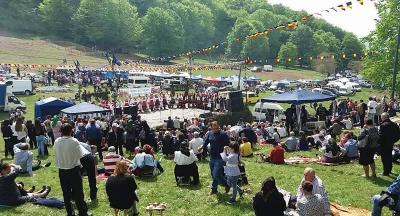Negresti Oas
*Disclaimer: The information and views set out in this page do not necessarily reflect the official opinion of the Council of Europe and/or the European Commission. Neither the Council of Europe, the European Commission nor any person acting on their behalf may be held responsible for the use which may be made of the information contained therein.
Last update: 12/01/2017
Negresti-Oas is located near the Ukrainian border, in the north-eastern part of Satu Mare County, the third largest urban locality from the County, at 50-55 km from Baia Mare, Satu Mare and Sighetu Marmatiei urban senior centers. The town administers another two villages, Luna and.
From the available data, 95% of the population are ethnic Romanians, while 2.9% are ethnic Hungarians and 1.9% Roma. There are officially 492 men and 508 women within the Roma population.
The Roma inhabitants live in smaller or larger communities, within 6 neighborhoods of the municipality: Tuba, Unirii, Luna, Politie, Garii, Balta. Most of the homes in the community are modest, some are in very good conditions, others need maintenance/ repairing and some are in an advanced stage of degradation, need pest control/ deratization, repairing and connection to utilities.
Most of the Roma population are unemployed, some of them are working on day to day jobs or seasonal jobs.
The ROMACT Process
Negresti Oas joined ROMACT Program in August 2016. The Local Authorities of the municipality Negresti Oas have taken a series of actions towards the improvement of Roma citizens living standards, materialized in several educational programs (afterschool programs, projects which supported access, presence and attending school for Roma children), infrastructure (building roads, water/sewage/electricity networks), employment (counselling, social services) etc.
The Community Action Group (CAG) identified some of the short/medium/long-term problems:
Short-term priorities:
- Solving the lack of identity/property documents problem;
- Improving the sewage network, to stop flooding the yards when it rains;
- Implementing educational programs for children (after school programs, step by step);
- Implementing educational programs for adults (completion of studies, “second chance” programs, school for the parents);
- Organizing qualification courses for the community members in order to find jobs;
- Creating jobs for the members of the community – accessing funds for developing small businesses;
- Rehabilitate the roads in the community;
- Free transportation for the Roma children attending school;
- Providing plots to build new houses – granted by the Local Authorities.
Long-term priorities:
- Extending the water/sewage/electricity networks in the community;
- Creating a playground for the children in the community;
- Rehabilitation and sanitation of the houses in the Roma community;
- Building social houses for poor families and for young people;
- Employing a school mediator on a full schedule;
- Implementing programs in order to develop and sustain permanent education – physical and mental health, sexual education, education regarding the responsibility and empowerment of the Roma ethnic group in terms of personal hygiene, maintaining cleanliness in the vicinity and the places that they attend;
- Creating an NGO to help represent their interests and needs.
Trainings/expertise provided for the local administration:
Applying for European Structural Funds
Elaboration of the JAP
Activities involving the community action group:
Training on community development and civic participation
Training on human rights
Training related to labor market
So far, the following measures to solve problems in Roma community were taken:
| Problem | Solution | Budget | Beneficiaries | Status |
|---|---|---|---|---|
| Poor roads infrastructure | Roads asphalting | 340.000 euro | 100 persons | Process finished |
| Lack of property/ID documents | Recruitment of a legal consultant to manage lack of IDs | The entire community | Process ongoing | |
| Lack of sewage/water network | Rehabilitation and extension of the sewage and water network in the Tuba neighborhood | The entire community | Process ongoing | |
| Lack of minimum school education | Second Chance programs | 15 persons | Process finished |

